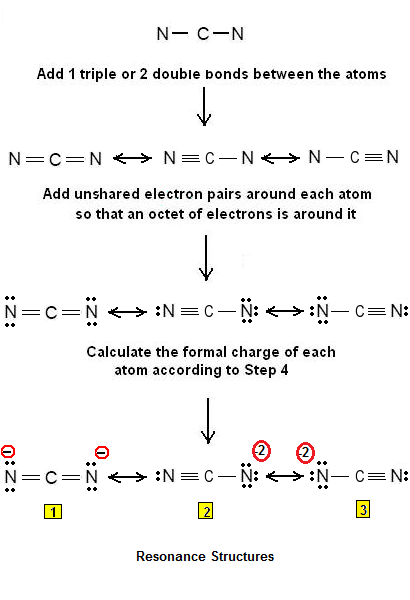Lewis Dot Structures of the Cyanamide ion NCN-2
A simple procedure for writing Lewis Dot Structures was given in a previous post entitled “Lewis Structures and the Octet Rule”. Several worked examples relevant to this procedure were given in previous posts please see the Sitemap - Table of Contents (Lewis Electron Dot Structures).
Let us consider the case of the NCN-2 ion and draw the Lewis dot structures:
Step 1: Connect the atoms with single bonds.

Step 2: Calculate the # of electrons in ð bonds (multiple bonds) using formula (1):
Where n in this case is 3 since NCN-2consists of 3 atoms.
Where V = 5 + 4 + 5 – (-2) = 16
Therefore, P = 6n + 2 – V = 6 *3 + 2 – 16 = 4 Therefore, there are either 2 double bonds or 1 triple bond.
Step 3 & 4: The Lewis structures of of NCN-2 are as follows:

The ion represented by the electron dot structure #1 is the most stable comparing to the #2 and #3 because of less charge separation. The cyanamide ion is isoelectronic and hence isostructural with the CO2 molecule.
Relevant Posts
Lewis Structures|Octet Rule: A Simple Method to write Lewis Structures
Canonical Structures - Lewis Dot Structure of OCN-
References
- G.N. Lewis, J.A.C.S, 38, 762-785, (1916)
- E. C. McGoran, J. Chem. Educ., 68, 19-23 (1991)
- A.B.P. Lever, J. Chem. Educ., 49, 819-821, (1972)
Key Terms
resonance structures of cyanate ion NCN-2, Lewis electron structures of cyanamide ion, chemical formula of the cyanamide, simple procedure for drawing Lewis structures of cyanamide ion,
I'm confused, I thought there would be 18 electrons not 16, there is a negative charge of 2, thus there are 2 extra electrons? In which case there would be a single bond and a double bond, along with a lone pair. No?
ReplyDelete